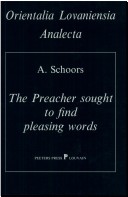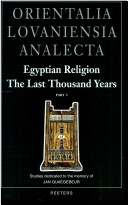Orientalia Lovaniensia Analecta
2 total works
v.41
Among biblical wisdom literature the Book of Qohelet is well known for its idiosyncratic ideas. Also from a linguistic point of view, however, this book is a maverick in the Bible. Its language is difficult and puzzling. In most commentaries some linguistic pecularities of Qohelet have received due attention and more recently studies on the language of the book have appeared. The present monograph presents an inventory and a thorough study of those peculiarities in the format of a grammar: orthography, phonetics, morphology and syntax. Against some recent challenges the author defends the general consensus among critical scholars that the language of Qohelet is definitely late in the development of Biblical Hebrew. He accepts the presence of a number of Aramaisms, but rejects the Aramaic translation theory. Also Dahood's "Phoenician" theory is discussed in detail and rejected. The whole research is done in a continuous dialogue with linguistic and exegetical literature on Qohelet, as can be seen from the extensive bibliography. The second part of this study - on the vocabulary of Qohelet - has been published as Orientalia Lovaniensia Analecta 143.
v.84
The final stages of Egyptian religion from the Saite period until the rise of christianity are studied here by nearly a hundred scholars from all over the world. The book represents the state of the art on a fascinating period, when paganism in all its forms gradually yielded to monotheism. It combines philology and archaeology, with more than twenty contributions offering a presentation of unknown textual and iconographic material. Egyptian deities and temples are discussed both from the point of view of institutions and of personal religion. In the multicultural society of Graeco-Roman Egypt the relationship between native Egyptians and Greek culture is always at the center of the interest. Thanks to the indexes this will become a standard work of reference in the field of Egyptian religion. The volume is dedicated to Jan Quaegebeur and reflects his wide scope of interests and his impact upon present-day study of Egypt in the Graeco-Roman period.

